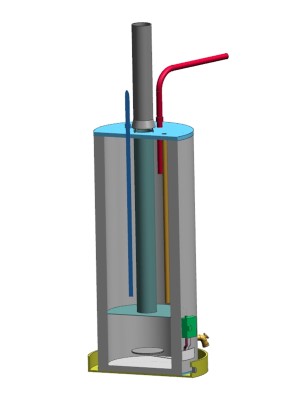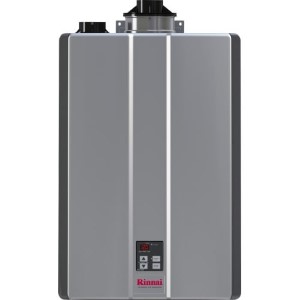Drinking Hot Water from a Water Heater: Is it Safe to Drink?
Water heaters are essential in modern homes, providing hot water for various uses.
However, the practice of drinking hot water from a water heater raises important health and safety concerns.
This article aims to shed light on the implications of consuming hot water from such sources, exploring the potential health risks, the quality of water provided by different types of heaters, and the necessary precautions to ensure safe consumption.
 photo: pixabay
photo: pixabayThe quality of hot water can vary between tankless and tank-type water heaters
 Gas water tank heater Gas water tank heater |
 Tankless water heater Tankless water heater |
Most of the time, when we require hot water for our daily needs, we have the option of obtaining it from one of two primary sources: either a traditional tank water heater or a tankless water heater.
Tank-type water heaters store and heat water in a large tank. They maintain a preset temperature, ensuring that hot water is available at all times. Water is heated by an energy source like gas or electricity and kept warm until needed. This design, while convenient, can lead to energy losses due to the need to maintain the water temperature in the tank, known as standby heat loss.
The quality of the hot water can be influenced by how well the tank is maintained. Initially, the hot water from tank-type heaters is of good quality, as it is heated and stored at the desired temperature. However, over time, sediment and minerals may accumulate at the bottom of the tank, affecting water quality.
On the other hand, tankless water heaters, also known as on-demand heaters, heat water directly without the use of a storage tank. When a hot water tap is turned on, cold water travels through a pipe into the unit, where it is heated by either a gas burner or an electric element. This means that water is heated as it is needed, providing a constant supply.
The quality of hot water from tankless heaters is generally excellent because it is fresh and not stored for extended periods. There's less risk of water sitting in a tank and potentially accumulating sediments or contaminants.
However, it's important to note that the issue of water quality in water heaters still persists. Many experts advise against drinking or using hot water from the water heater for cooking due to concerns about its safety and potential contaminants.
Water quality must be regulated
Ensuring that the water flowing from our taps meets the standards of safe drinking water quality is of paramount importance. The responsibility for maintaining this quality is subject to strict monitoring, with health departments regularly conducting comprehensive assessments to assess water quality.
At a minimum, it's the responsibility of the water supplier or distributor to follow rules and regulations that keep our drinking water safe and healthy for everyone.
These measures not only guarantee the availability of clean and safe drinking water but also provide essential safeguards against potential health hazards arising from waterborne contaminants.
There are two factors that affect water quality change – staleness and high temperature
If water is left in pipes for more than four hours, you should let it run for about 30 seconds before drinking. This guarantees the removal of stale water, which may contain impurities from the pipes and materials it has come into contact with. The same applies to water from the water heater tank, where the water stays for hours.
Water temperature exacerbates the situation as water is a solvent. Heating increases the migration of metals into the water – for example, the solubility of lead in water is twice as high at 77°F as at 59°F. It's not just lead; some other toxic metals could be found in water pipes, fittings, fixtures, and other products, such as copper, galvanized iron, stainless steel, and even plastic. Different elements can leach into the water.
Overnight, for example, the values of copper, lead, or nickel from the fittings can be exceeded. Moreover, the development of bacteria may increase, especially with plastic pipes.
In addition to traces of lead in the water, one of the best-known threats is Legionnaires' disease. However, there are many misunderstandings about it. Legionnaires' disease is a type of pneumonia caused by Legionella – tiny rod-shaped bacteria that can only multiply in stagnant water. If inhaled with contaminated water vapor, Legionella can cause disease. On the other hand, there is no risk of infection if germinated water is drunk or used for washing hands. Reported cases of the disease are rare.
Legionella is killed when the water heats up to 60 degrees. This is also the prescribed temperature for hot water storage in residential buildings. Germs can, therefore, only form if residual water is in the pipes for a long time.
Guidelines for safe usage
Ensuring the safe usage of hot water from heaters involves several key practices.
First, maintaining the water heater at the recommended temperature setting, typically around 120 degrees Fahrenheit (49 degrees Celsius), helps prevent the growth of harmful bacteria like Legionella.
Regular maintenance, such as flushing the tank and checking for leaks or corrosion, is essential to keep the water heater functioning efficiently and reduce the risk of contamination. It's also important to follow manufacturer guidelines for maintenance and safety checks to ensure the heater's proper operation.
Testing water quality
Conducting Water Tests: To gain insights into the quality of the water in your home, consider conducting water tests at a local laboratory. These tests can detect the presence of bacteria, heavy metals, and other contaminants that may impact water safety.
Understanding Test Results: Interpretation of water test results is vital to assess the safety of your drinking water. Expert advice from chemists and microbiologists can help you understand the scope of the analysis and its implications for water quality.
Exploring alternative methods
Water Filters: Installing water filters, such as activated carbon filters or reverse osmosis systems, can provide an effective means of removing contaminants and improving water quality. These filtration methods can offer an additional layer of protection.
Boiling Water: Boiling water is a tried-and-true method for making it safe for consumption, as it kills harmful bacteria and pathogens. It is a simple and effective way to ensure the safety of your drinking water.
Special considerations
Infant Formula: It is essential never to use hot tap water to prepare infant formula. Babies have more vulnerable immune systems, and precautions must be taken to protect their health.
Immunocompromised Individuals: If your household includes individuals with weakened immune systems, extra caution should be exercised when considering the use of hot water from your heater for drinking.
Conclusion
While warm tap water can be a convenient source of hydration, it's vital to balance its benefits with potential risks associated with water heaters. By following safety guidelines, conducting regular maintenance, and exploring alternative methods for obtaining safe drinking water, you can make informed decisions to protect your health and wellbeing.